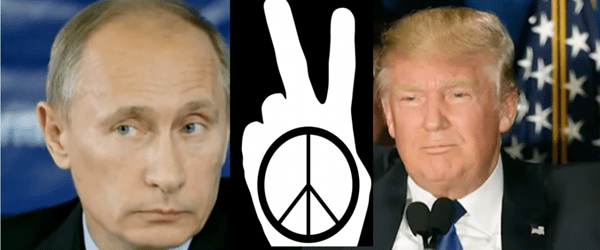 In a world desperate for compassion, it pains me to see hope and opportunity for peace squandered on blame, antagonism, and red-baiting.
In a world desperate for compassion, it pains me to see hope and opportunity for peace squandered on blame, antagonism, and red-baiting.
Donald Trump is poised to take the reins of the largest empire in the history of the world. U.S. drones rain death from the skies in 8 countries. Over 800 U.S. military bases litter more than 70 countries. And our war on terror spills onto our own streets as militarized police continue to kill unarmed African and Native Americans, largely without consequence. We have the largest wealth disparity in the world despite being the richest nation, yet over half of our spending goes to destroying nations abroad rather than building our own nation at home, let alone repairing damage done overseas and to the marginalized peoples on our soil.
This is the scene that is set, and soon to take center stage will be an administration that by all indications lacks the empathy, compassion, reason and will to begin to heal the many wounds the planet and people are suffering. With all that is at stake, now is the time for peacemakers to come together and form a creative, compassionate counter-force to powers of greed and violence. It’s time to unite, not against Trump and his cabinet but for all who suffer from militarism and imperialism. These have always been central to US policy but are now being thrown into harsh relief when wielded by an administration distinctly lacking in subtly. The veneer of public service falls with a thud to expose the naked ambition of power, profit and publicity, sounding a call-to-action to conscientious citizens throughout the nation.
But that action is being diverted from constructive coalition-building around the needs of the people to vilifying Vladimir Putin and the Trump administration along with him. Months after the election, speculation on what may have contributed to Trump’s surprise victory is focused primarily on the role that the exposure of DNC emails on Wikileaks has played. There is no way to determine how these emails, as one factor among many, played a role in votes of the electorate, but because blame for their release is attributed to Russia, long-demonized by the United States, a sinister narrative has overtaken the media: Russia hacked the election to help Trump win.
This narrative serves to delegitimize Trump’s election and foment hostility toward Russia all at once. It also serves to deflect responsibility for Hillary Clinton’s loss from the mistakes of her campaign and prevent critical self-reflection. An electorate that felt unheard, along with the gutting of the Voting Rights Act, poll closings, roll purges, and more, likely had a more consequential effect on the election than the released emails. But “Russia hacked the election,” has the time-tested unifying power of the scapegoat mechanism behind it, so this is the chosen narrative to keep the war machine turning.
I am skeptical of this narrative, but I have no proof that it is false. The recently released, heavily redacted report withholds evidence of this specific claim but offers conclusions based on past assessments of Russia’s activity and intentions. Journalists of integrity such as Glenn Greenwald do not deny the possibility of Russian involvement but stress that claims from the intelligence community do not constitute evidence. Other sources do deny the allegations, citing former British ambassador Craig Murray’s claim that the DNC emails were not hacked but rather leaked by a DNC insider. Julian Assange has claimed that Russia is not responsible for the leak, and while many are inclined to dismiss his word, it is notable that the intelligence report itself speculates that Russia chose Wikileaks for its reputation for credibility. Still, I am open to the possibility that Russia exposed DNC emails on Wikileaks in order to influence the United States’ election.
It is worth noting that the possible Russian interference in our election consisted of exposing emails which left American voters better informed of our choices, while U.S. interference in foreign countries consists of fomenting coups or outright regime change. The United States is constantly expanding its reach into other nations for the sake of our “national interest,” that is to say, for power and profit for an elite few. Our hands are by no means clean. So while I agree that any foreign interference is anathema to democracy, I don’t think we can see clearly enough to remove the splinter from Russia’s eye until we get this monstrous log out of our own.
The military-industrial complex stands to profit from antagonism toward Russia. The modern threat of terrorism cannot compete with the existential threat the former Soviet Union was made out to be when mimetic rivalry between the US and the USSR drove war profits – and the threat of annihilation – into the stratosphere. Now the Soviet Union has dissolved and the United States has eclipsed Russia in aggression, destabilizing the Middle East and expanding NATO to Russia’s border (in violation of the first President Bush’s promise not to expand eastward). But media emphasis on Russian force blinds us to our own aggression and gives us a villain against whom we can feel superior. And with Donald Trump proposing better relations with Russia, it is easy to bind his unpopularity and growing antagonism toward Russia together and allow them to fuel each other.
But the demonization of Russia, even if the charge of electoral interference is true, is counterproductive to the compassion that we must cultivate in order to bear one another’s burdens and lift each other up. If we are to survive, if our planet is to survive, if those the world over whose lives have been shattered by war are to have any hope, we must transform the narrative that underlies our human culture and particularly our American culture from enmity to empathy, before it swallows us whole.
As we ramp up our rhetoric, we also ramp up our arsenal. Our preparation for confrontation with the “ultimate enemy,” including weapons-making and training, are, in the immortal words of Eisenhower, “a theft from those who hunger and are not fed, those who are cold and are not clothed.” Now is the time we can least afford to defer resources that could help the most vulnerable to our already-bloated military. This is to say nothing of the risk we take to our own security and the devastation we wreak worldwide when our time, resources and intellect are devoted to violence and destruction.
And this culture of enmity is not only diminishing our security and robbing our communities of the resources they need to survive and thrive. We are destroying our own souls. As we blind ourselves to our own destruction and ramp up fear and animosity, we feed a culture of insulation and distrust. We shut the doors to the refugees fleeing the very lands we destroy. We escalate the militarization of our streets and violence based on paranoia increases. Racial minorities and those with mental illness will be most vulnerable to violence, but none of us will be immune. Every problem we face today is exacerbated by expending our energy in the direction of enmity.
Thus as anger, frustration, and fear of Donald Trump is channeled into animosity for Russia, it undermines the urgent work of peacemaking and ultimately fuels the suffering of the most vulnerable. For those like me who are skeptical that Trump’s administration will help those in need, the call is to focus our energy not on animosity – not toward Russia or even Trump himself – but on those who need help. When we keep in mind the human lives that will be affected by this or any administration, we keep our perspective on what it takes to build up lives, rather than take down an enemy. We listen and seek understanding, we build our capacity for empathy and compassion, and we are more able to recognize good even when it comes from those with whom we vehemently disagree. From this perspective, we can see that getting along with Russia is one Donald Trump’s better proposals in a sea of potential catastrophes that can only be averted by refusing a culture of war, animosity and enmity and insisting on compassion and cooperation.
Less red-baiting; more peacemaking must be our guiding principal, for the next four years and evermore.
Image: Screenshot from Youtube: “Obama punishes Putin while Trump praises him,” by Fox News, and “Peace Sign 2” by Tammy Sue in Public Domain Pictures. Changes made.











